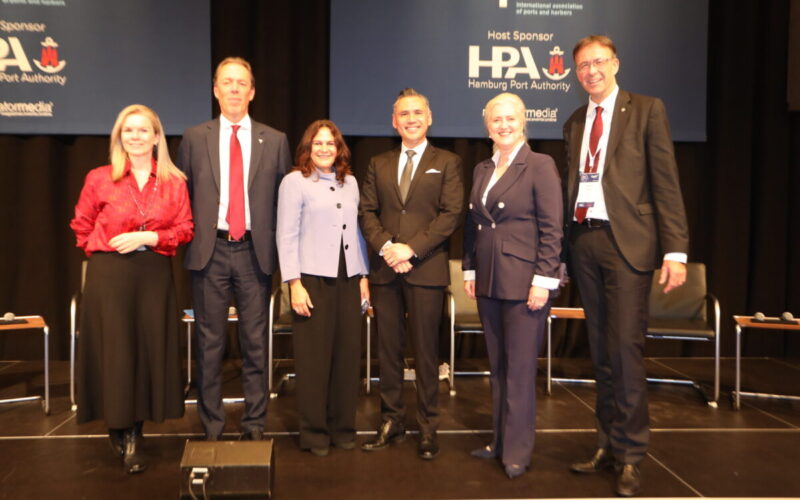Cover Image Credits: World Ports Conference 8-10 October 2024, Richard Langdon
In today’s unpredictable world, resilience is more important than ever for global supply chains. But true resilience is not just about reacting to disruptions—it is about anticipating problems, adapting quickly, and working together.
At the IAPH 2024 World Ports Conference, held on 8-10 October in Hamburg, a panel of industry experts came together to discuss how innovation and collaboration are key to helping supply chains survive uncertainty while staying efficient.
Stéphane Graber, Director General of FIATA, kicked things off by pointing out the rising uncertainty in global trade, driven not just by disruptions but also by geopolitical instability. He stressed that logistics systems need to be more flexible, with alternative routes and logistical hubs becoming more vital.
“The logistics industry has to create options—different routes, rules, and solutions to handle these disruptions,” he said.
One of the biggest challenges, he pointed out, is the lack of consistency in global regulations, particularly in shipping: “We need to move from collaboration to coordination, making sure that regulations are aligned across the globe. Otherwise, we risk unnecessary costs and inefficiencies.”
He noted that the many layers of regional regulations create barriers to international operations. Streamlining these rules, he argued, would improve transparency and lay the groundwork for future growth.
READ: Reskilling and Upskilling to Enhance Resilience and Competitiveness
Angela Titzrath, CEO of Hamburger Hafen und Logistik AG (HHLA), explained that resilience is not just about preventing disruptions but also about responding to them quickly. She talked about how HHLA has invested heavily in digital infrastructure, like creating digital twins for port operations, to make operations more secure and adaptable.
“We’ve embraced automation, and our port is a leader in the digital transition. We’re also diving into autonomous vehicles and drones to improve both efficiency and sustainability,” she said.
“The future of logistics depends on collaboration between sectors—rail, road, air, and ports. We’re putting a lot of effort into leading this charge.”
She emphasized that sustainability and digitalisation are areas where the industry must work together, not compete, to ensure smooth and efficient goods movement.
READ: HHLA joins eco-friendly shipping initiative
The conversation then turned to real-world examples of how ports are adapting to disruption. Noel Hacegaba, COO of the Port of Long Beach, shared some recent challenges, including delays caused by hazardous cargo and infrastructure issues. He highlighted that resilience is not just about reacting to immediate problems—it is about preparing for future ones, like the shift to zero emissions.
“The move to zero-emissions infrastructure is a big challenge, but it’s one we have to take on to future-proof our operations,” Hacegaba said.
“The only way we can tackle these challenges is through collaboration.”
He added that in the US, sustainability and emissions reduction have been key focuses: “Since 2005, we’ve made significant strides in cutting air pollution and GHG emissions. Collaboration with the private sector and regulators has been crucial in making this happen.”
But he also pointed out that global regulations could help speed up progress: “If we had unified international regulations, instead of regional or national ones, we could move faster and avoid putting leaders in sustainability at a disadvantage.”
READ: Port of Long Beach, Shenzhen partner to enhance maritime decarbonisation
Ilya Espino de Marotta, Deputy Administrator of the Panama Canal, reflected on the challenges of 2022, which she described as the most difficult year in the Canal’s history due to record demand, leading to fewer daily transits.
She explained that the Canal responded by focusing on communication and collaboration with customers, introducing a full reservation system and long-term contracts to ensure reliability and flexibility while maintaining efficiency.
She also spoke about the importance of water, a vital resource for both shipping and Panama’s needs: “Climate change is impacting water availability, and we’re putting long-term plans in place to ensure water security for the next 50 years.”
READ: Red Sea and Panama Canal disruptions amount to $1.25 trillion economic loss
Finally, Jacques Vandermeiren, CEO of Port of Antwerp-Bruges, discussed how his port has worked closely with other European ports, particularly in the energy sector, to respond to recent disruptions. He pointed out Antwerp’s role in securing alternative gas supplies during recent shortages and emphasized the need for collective action to meet the goals of the European Green Deal.
“No one can do it alone. We all need to work together to build the infrastructure necessary for a sustainable future,” he concluded.
The panel concluded with a shared commitment to resilience, innovation, and collaboration. By embracing new technologies and working together, the logistics and port sectors can better navigate global challenges and stay prepared for whatever comes next.








